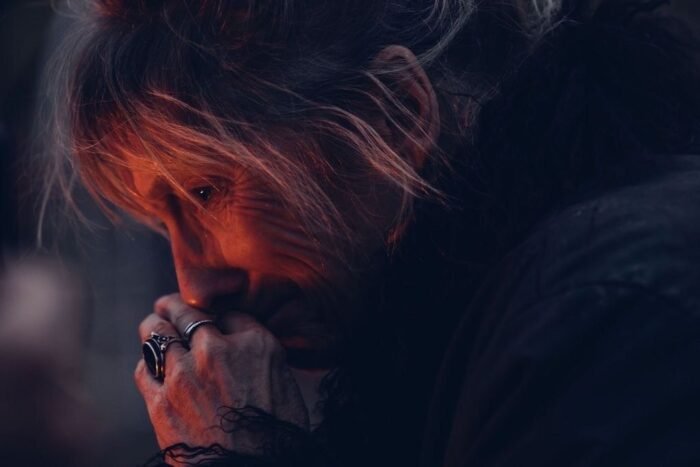There is no shortage of post-apocalyptic indie dramas out there. Hell, at this point, I’m fairly certain you could find a Tubi subgenre dedicated to these films without going very deep into the subscription service. The idea of the end of the world is generationally compelling, and the plots tend to cater to small budgets. The most successful are typically from the most innovative voices. Academy Award nominee Hubert Davis (2005 Best Documentary, Short Subject, Hardwood) steps away from a career in docs to present The Well, an end-of-days feature that isn’t just realistic, but may be a future we’re growing ever closer toward.
In the days leading up to the Fantasia International Film Festival, I began hearing rumblings of The Well. Odd, I know, since the film’s World Premiere was at Fantasia, but between press releases and news stories leading to the film’s screening, it isn’t surprising to see. However, once a seed like that was planted, a fixation was born to know why. So, of course, I had to see The Well, if only to understand the film’s sudden obsession with me.
Full disclosure, I’m a big fan of this sci-fi-horror subgenre and tend to seek out many underground titles that basically verge on post-modern westerns. Obviously, there’s lawlessness, but there’s also finite access to the goods and services we take for granted, which is essentially the key element of The Well. The film, unlike most movies in this space, doesn’t contend with supernatural or cosmic threats. Instead, the melancholia of living becomes a rebellion against death. But in The Well, we’re discussing a profoundly real threat no one is openly discussing, but one humanity is venturing closer toward every day.

The Well opens on the new American Gothic of the nuclear Divine family, Paul (Altered Carbon’s Arnold Pinnock), Elisha (Land of the Dead’s Joanne Boland), and their daughter Sarah (Suicide Squad’s Shailyn Pierre-Dixon). The parents are still mourning the loss of their son, alluding to a situation of helping someone who heartbreakingly broke their trust. This causes Paul and Elisha to be more careful when it comes to Sarah, causing her to feel as if her parents can’t see her as a growing teenager. For Sarah, her brother’s death is in the past, while it remains an ever-present reminder of the threats that exist in their current landscape.
On a farmstead, hidden away from public view, the Divines are scraping by. Barely surviving, by middle-class standards, but thriving in comparison to what’s left of the world. Their secret? An underground well. In a future where resources are limited and most water is contaminated, clean water is synonymous with wealth, and there’s a whole world of people who would be interested in securing it.
The Well gets more engrossing with the arrival of Jamie (The Fire Inside’s Idrissa Sanogo), a young man claiming to be Paul’s nephew. Jamie is carrying a photo of himself as a child beside his father and Sarah, but when it comes to discussing the past, he says that they were trapped and made lab rats in a nearby camp. However, the details are short and measured. It’s not enough for Paul to discern whether Jamie’s lying, but it’s enough that the family isn’t sure enough about him either. Even Sarah catches some subdued behavior she finds a little off, as well. After Jamie survives being quarantined for a few days, to check him for disease from unclean water, he’s allowed to join them on the property.
Jamie arrives just at the right time, as The Well begins bringing up dirty water. A new filter is needed, but it’s not like you can just run out to The Home Depot and grab one. Caught in the act of leaving one morning, Jamie tells Sarah he knows a way they may be able to fix the filter, and, untrusting of Jamie, Sarah decides to accompany him on his journey.
The Well splits here, as Jamie and Sarah’s pilgrimage leads them to a Fallout 4 style post-apocalyptic encampment, complete with its own Mama Murphy in Gabriel (Anything for Jackson’s Sheila McCarthy), that is, if Mama Murphy were a power-obsessed autocrat. Gabriel is the mastermind behind the breakout at the military camp, which has earned her a certain modicum of endearment among others at the settlement, but as Sarah quickly begins to see the way Gabriel wields her power, she also sees the fear in the eyes of anyone who dares cross Gabriel.
People have been using the term Afrofuturism a lot when talking about The Well, and while it’s correct, it occupies a very different space than what most moviegoers are accustomed to seeing when a film is defined that way. For example, when I think of Afrofuturist titles, I think of Sun Ra in Space is the Place or Anisia Uzeyman and Saul Williams’ Neptune Frost, the way I think most people would. Films where the future of Black culture is hopefully brightened by an array of technological advancements and achievements attributed to Black innovators, usually contrasted against social injustices occurring in the past or present. The Well checks all of these boxes, but without ever engaging in exaggerated fantasies of the future, making it very different, and distinctly darker, from what audiences are used to seeing, such as in the titles mentioned.

Hubert Davis doesn’t adorn The Well with the bright and shiny aesthetics of lights and gadgetry, setting the contrast between two regimes. For the Divines, Sarah is the future, and it may be up to her to carry the weight of what that means when the time comes, but that means preparing her for it, which includes fixing the filter for The Well. As Sarah and Jamie find themselves under Gabriel’s thumb, the atmosphere is a lot thicker. Paranoia and threatening fear tactics become the adjustment in Gabriel’s group. Remember, they escaped a place worse than this to be here, but being better by comparison doesn’t necessarily mean that better is very good.
So, there’s this liberation aspect to The Well, too, and it asks the audience to consider the plight of so many people who are just trying to survive. A commentary about the haves and the have-nots emerges with a look into the differentiation in the way the Divine’s democratic republic is compared to Gabriel’s autocratic communism. While Sarah may not be old enough for her parents to want to see her get hurt in any measure, they still grant her freedoms and let her voice be heard. In contrast, Gabriel’s system is honesty and fealty, and the body dead outside the settlement speaks volumes to anyone who isn’t on board. No government is a perfect system, but the differences are rather apparent. Davis doesn’t suggest solutions, but argues for the world to be better to each other, share resources, and build community over the greed facilitated by power.
The Well’s themes are relatively easy to grasp, given the state of the world and the greed that is leading water to become a limited resource. From data centers drying up communities in the Southeast United States, to precious metal mining creating toxic runoff, an industry that’s currently booming in Africa. That, combined with the commentary on rulers and governments, the kind many zombie films utilize, helps The Well to be an efficient eco-disaster model for the way the world ends, and it’s audacious and eye-opening.
The content of the film can run a little dry in The Well. The subject matter is dramatic and starkly so at times, but for an indie dystopian, end-of-the-world thriller, it is well-balanced in three perfectly structured acts with wonderful transitions and tense moments. This is really my way of mentioning how well it is written by Michael Capellupo and Kathleen Hepburn. While it never strays too far from the established template, it remains compelling through the grim portrait of the path we’re paving ahead for ourselves. It also projects a beautiful landscape through adept direction and a nonchalant style of cinematography, a skill Stuart James Cameron flaunts effortlessly.
As I said previously, I am a huge fan of this subgenre, but it’s not always one that produces zeitgeisty films. This is a thinking person’s subgenre, contending with rich subtext, bleak themes, and occasional monotony. Davis’ film is never languorous, but it is critical and weighty, which won’t be everyone’s cup of tea. There are plenty of small moments that will inevitably remind you of other films you’ve seen in the eco-horror space (for me, it was Dalila Droge’s No More Time, James Morrison’s Diverge, and some Walking Dead), while some other aspects contend to be boldly original. Davis steers The Well fantastically, as it never bogs down, and the visual and contextual threads are woven together to create an increasingly intriguing narrative.
The Well held its World Premiere at the 2025 Fantasia International Film Festival on Monday, July 21. Check out the film’s page on the Fantasia website for more information.




